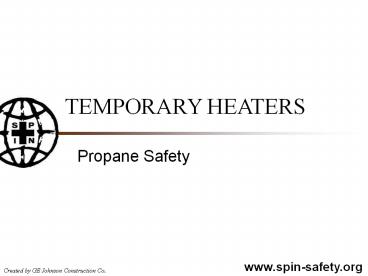TEMPORARY HEATERS - PowerPoint PPT Presentation
Title: TEMPORARY HEATERS
1
TEMPORARY HEATERS
Propane Safety
2
Disclaimer
The information presented in this presentation
has been compiled from sources believed to be
reliable and is intended to be a tool to assist
and guide you in building your own presentation.
This program may not address all the hazardous
conditions or unsafe acts that may exist. For
that reason, SPIN cautions users to confirm
accuracy and compliance with the latest standards
and best practices. Local, State/Provincial and
Federal regulations take precedence over this
material. Implementation of any practices
suggested by this program is at your sole
discretion, and SPIN will have no liability to
any party for any damages including, but not
limited to, direct, indirect, special or
consequential damages, arising out of or in
connection with the information provided or its
use.
3
TEMPORARY HEATERS
- Circulating air type heater
- maintain 12 clearance on both sides rear
4
TEMPORARY HEATERS
- At least 10 from tarps, canvas or similar
coverings - Set level on non-combustible surface
5
TEMPORARY HEATERS
- Locate heater at least 6 from LPG bottle
- Heater blower not directed toward bottle within
20
6
TEMPORARY HEATERS
- LPG containers shall sit on level substantial
surface - Tie cylinder in upright position if necessary
7
TEMPORARY HEATERS
- Supply fresh air
- Use fans if necessary
8
TEMPORARY HEATERS
9
PROPANE TEMP HEATERS
- Frost on tank means
- drawing too much vapor
- reduced fuel flow
- Dont lay cylinder on side
- Dont change regulator setting to increase fuel
flow
10
TEMPORARY HEATERS
- Carbon Monoxide
- odor/colorless
- 55 PPM max. exposure
- Carbon Dioxide
- odor/colorless
- 5,000 PPM
OSHA TLV, 1997
11
PROPANE
- For every 100,000 BTUs, use one 100 lb. tank
- Separate heaters by 20
- Max. 3 bottles (300 lb..) per heater
12
PROPANE
- Manifolds
- dont use copper, they leak!
- Use only LPG or LP-Gas rated rubber hoses
- No auto-type hose clamps
- Test connections for leaks
13
PROPANE
- Cylinder connectors should have flame-loss device
to shut-off fuel if pilot light or flame goes out
14
PROPANE
- TANKS
- valve-end up while in use
- place away from heaters, electrical panels, slag,
flames, etc.
15
PROPANE
- Dont take into confined spaces
- Gas is heavier than air
- Expands at 1270 ratio
- displaces oxygen
16
PROPANE
- Do not store inside buildings or gangboxes
17
PROPANE
- Protect tanks from damage
18
PROPANE
- At least one, 20-BC fire extinguisher per
storage area - 501 lbs.gt, 10 from building
check with local FD
19
PROPANE
- 1,000 OR gt pounds
- DOT placards
- Bill of Lading
- CDL, 21 years old, speak read English
20
NATURAL GAS
- Flex hose not to exceed 25
- Leak test all connections
- All connections have pull strength of 400 lb.
- Flame-loss device
check with local FD
21
As a Safety Professional, SPIN encourages you to
submit safety resources that are particularly
beneficial to fellow Safety Professionals. We
welcome your suggestions and thank you for your
input. Please use the following instructions when
submitting resources. 1. Please include your
full name (first last) in the subject section
of the your email 2. Please include a brief
description, name of program and version of any
and all files submitted 3. Please use a
compression program, like WinZip, when submitting
multiple or large files 4 Please include
appropriate contact information (name, phone
number, etc.) when referring potential new
members 5. Include links to safety related
URL's in the description section 6. Please send
photos and graphic files as 72 dpi jpg, tif or
gif files submit all items to
info_at_spin-safety.org
For more information about SPIN visit the
web-site at www.spin-safety.org or call
1-800-673-0439































